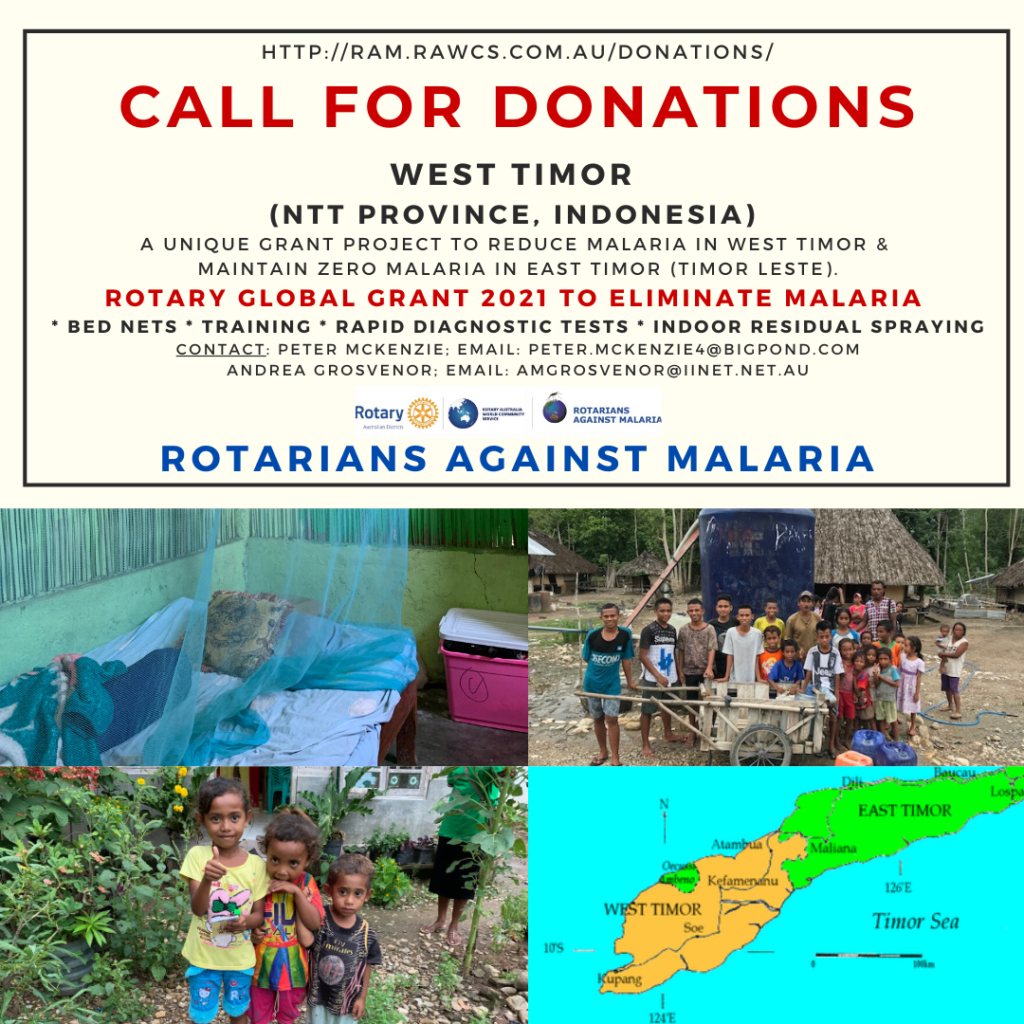Introduction
Malaria is a life-threatening disease. Globally, in 2018, malaria threatened the lives of nearly 50% of the global population. In that year, an estimated 228 million were infected with malaria and there were 405,000 deaths with an estimated 1,109 deaths per day. The most at risk for malarial deaths were children under five who made up 67% of the deaths in 2018. The other sinister aspect of malaria is that it plunges victims into a vicious circle of poverty, as the sick is unable to work and children are unable to go to school.
In our Oceania region, Rotarians in Australia established the group Rotarians Against Malaria in 1990, to end the scourge of malaria in Papua New Guinea and Solomon Islands. Since then, Rotarians Against Malaria has coordinated Rotarians’ support to eliminate malaria in our partner countries.
Rotarians have helped reduce malaria in Vanuatu, PNG, Solomon Islands and Timor Leste.
Unfortunately, today, malaria remains a daily threat in a number of our Oceania neighbours. Papua New Guinea has the highest number of malaria cases with an estimated annual parasite incidence of 160 new cases per 1,000 at risk population, in 2019. In the last five years, PNG and Solomon Islands have seen increasing numbers of malaria cases.
Maintaining zero malaria in Timor Leste
Since 2006, Rotarians have contributed to Timor Leste’s success in achieving zero indigenous malaria. Timor Leste reported an estimated 223,002 cases in 2006. Within 10 years, in 2016, with help from the Global Fund, World Health Organisation (WHO), and Rotarians Against Malaria, malaria cases were reduced to less than 100. The exponential decrease in malaria cases continued. In 2019, Timor Leste reported zero indigenous malaria with nine (9) imported malaria cases.
Between 2011 and 2019, Rotarians have donated a total of 112,000 bed nets valued at nearly half a million USD. Rotarians’ actions would have averted many malaria cases and have given Timorese a chance for a better life.
Rotary Global Grant for Timor Leste
The Rotary Club of North Hobart in D9830 has contributed to Timor Leste’s success story.
With help from D9830 The Rotary Foundation (TRF) Chair and Rotarians Against Malaria, the Rotary Club of North Hobart developed the Grant project design, and assisted in fund raising. The Grant galvanised wide-spread support in Australia for Timor Leste. A total of 15 of 21 Rotary districts donated their District Designated Funds to the project. In addition, 13 Rotary clubs in D9800 and two Rotary clubs from across Australia donated towards the Grant. A total of USD251,334 matched Grant from TRF was raised.
The Rotarians’ support for Timor Leste reflected our mindset that ‘we can and will make a difference’ in our humanitarian International Service.
Assisted by the host partner Rotary Club of Dili Lafaek in Timor Leste D9550, The Rotary Club of North Hobart in D9830 commenced the Grant project in 2018 and will close the project in end of 2020.
Rotarians should be proud of the Grant’s outputs. We have donated a total of 40,000 long lasting insecticidal nets to pregnant women throughout Timor Leste. In addition, we trained 107 Community Health Workers, and strengthened Timor Leste’s indoor residual spraying (IRS) program through a donation 80 sprayer machines. Rotarians have contributed to maintaining zero malaria in Timor Leste.
Next steps
Gains are fragile in malaria elimination. Successes can be overturned by the lack of resources. Malaria prevention, early diagnosis, treatment and tracking must continue. As the saying goes, ‘foot off the gas pedal’ and malaria will return with a vengence.
In June 2020, Rotarians Against Malaria, the Rotary clubs of Darwin and Dili have submitted a Rotary Global Grant application for Timor Leste, to provide 5,000 bed nets in 2021 and 2022. Other items will also be provided such as information, education and communications materials, and materials on malaria diagnosis and treatment for health facilities.
To continue our work to end malaria, we need Rotarians support. Please donate to the Rotarians Against Malaria here.

